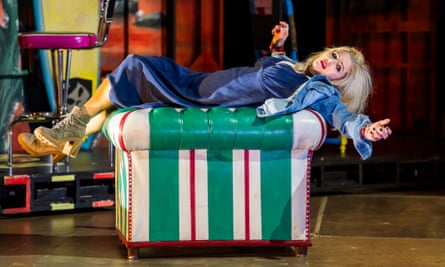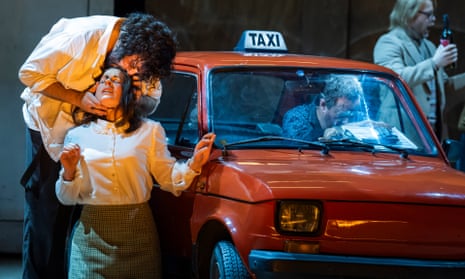Opera North’s Cavalleria Rusticana was designed to be detachable: it premiered as part of the company’s 2017 Little Greats season, appearing alongside a variety of fellow one-act operas rather than just the customary Pagliacci. For this season’s outing, however, director Karolina Sofulak has coupled it only with Rachmaninoff’s Aleko, in which another insular society (this time a bohemian commune) is fractured by a love triangle turned fatal. Sofulak goes further still, explicitly linking the two operas by conceiving Aleko and Cavalleria’s Alfio as the same man, 20 years apart, and haunted – in every sense – by a crime he is doomed to repeat.
Both stagings shift the action of their operas significantly: Cavalleria Rusticana trades sun-kissed Sicily for 1970s communist Poland, and Aleko’s gypsies become the free-loving denizens of a 1990s surfers’ colony, with designs by Charles Edwards (sets) and Gabrielle Dalton (costumes) doing delectable justice to both settings. If the former, with its stripped-back aesthetic and prevailing unease, packs more of a wallop than the candy-coloured latter, the same might well be said of the operas themselves: Rachmaninoff’s episodic score can’t quite match Mascagni’s, neither for momentum nor for word-painting, richly evocative though it undoubtedly is.
As both Alfio and Aleko, bass-baritone Robert Hayward is magnetic: no snarling villain, despite a voice carved from granite, but rather a stolid, introspective figure whose self-torture slowly but surely bubbles up and into outward violence. Tenor Andrés Presno’s Turiddù is as indulgently Italianate as the production isn’t, although he seems physically more at ease as Rachmaninoff’s carefree Lover, while mezzo soprano Anne-Marie Owens is a suitably implacable Mamma Lucia; she also returns, Erda-like and unaltered, to pronounce the young lovers’ deaths at the conclusion of Aleko.

Sofulak thankfully avoids stereotyping the women who incur Alfio/Aleko’s rage. Lola, elegantly sung by Helen Évora, is enigmatic, visibly divided in her own affections, while Elin Pritchard’s vivacious, bright-toned Zemfira embodies the commune’s spirit of independence without slipping into coquettish caricature. Most fascinating of all is Giselle Allen’s magnificent Santuzza: her progress from self-effacing piety to unfettered fury – with a hint of Mary Magdalene along the way – as electrifying to hear as it is to watch.
The Orchestra of Opera North, conducted by Antony Hermus, does a fine job of matching both the restraint of Sofulak’s Cavalleria (though it’s a joy to hear the reins loosened in the Intermezzo) and the gilt edges of the Rachmaninoff, and the Chorus likewise brings characteristic polish to proceedings. Indeed, the final choral ensemble of Aleko in particular is as arresting as anything conjured up by Mascagni: more evidence in favour of occasionally finding Cav a companion other than Pag, whether or not it’s a perfect match.

Comments (…)
Sign in or create your Guardian account to join the discussion